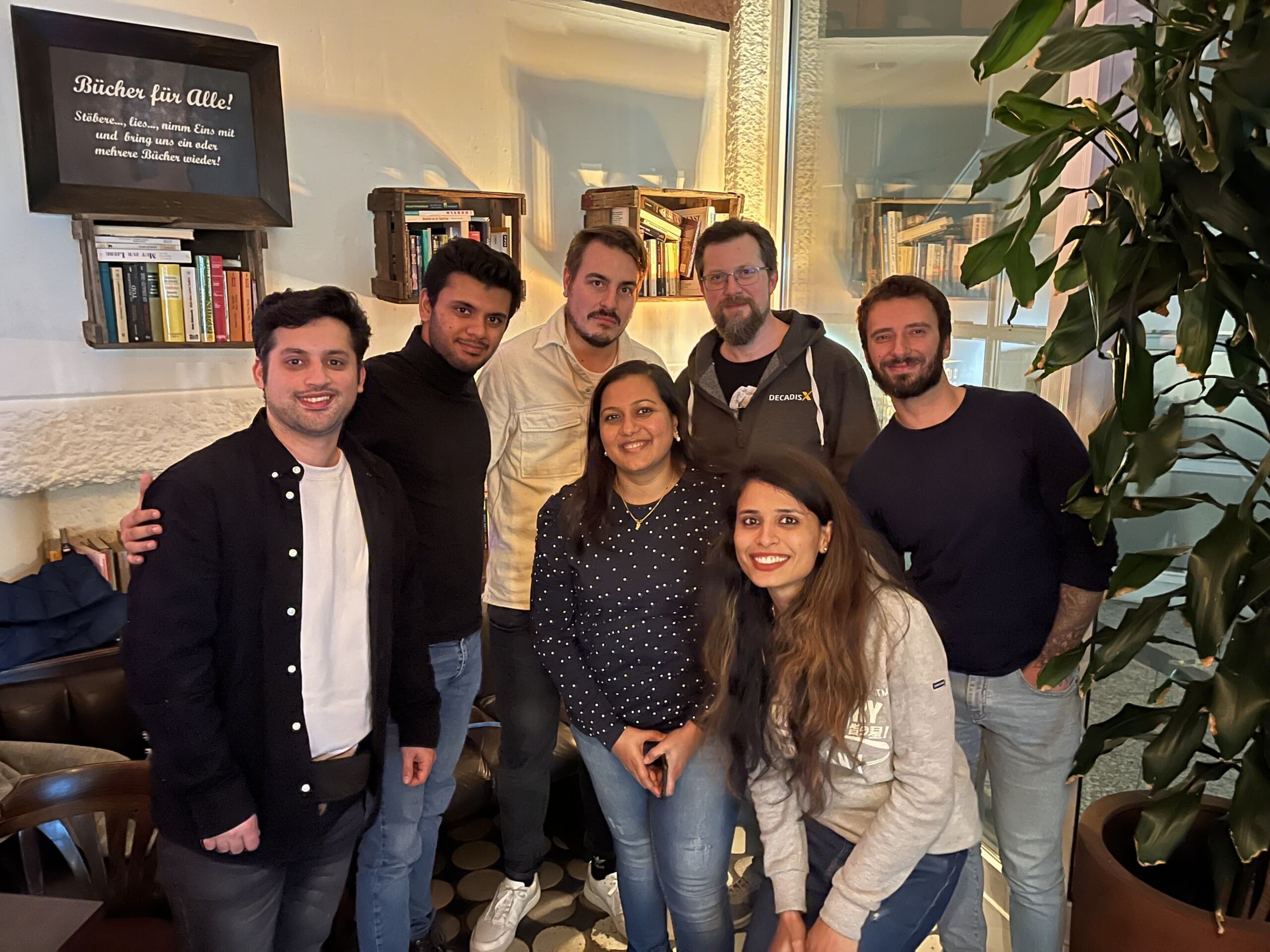From electronics engineering to full-stack development, from navigating a new country to balancing motherhood and code, Shreya’s journey is one of quiet strength, constant reinvention, and the confidence that comes from doing things on her own terms.
Bio
Shreya has been a Full-Stack Software Engineer at Decadis since 2021, dedicated to creating impactful products. With a background in Data Engineering and Project Coordination across Telecom and Banking sectors, she transitioned into Full-Stack development to pursue her true passion.
Beyond her professional life, Shreya is an avid fitness enthusiast. Whether she’s experimenting with healthy recipes or enjoying a run in the park, she believes in maintaining a balanced and active lifestyle.

The Conversation
Welcome to HERpower, Shreya! Could you start by telling us a bit about yourself?
Shreya: I am Shreya, and I am a software engineer, originally from India. I spent about six and a half years working in the IT industry back home before moving to Germany after getting married. I have a background in electronics and communication engineering, but my true passion has always been coding. I started my career at Vodafone, where I initially worked as a junior project manager—though I wasn’t too keen on the managerial part. My heart was always in tech, so I made the switch to a data engineering role within the company, which eventually led to positions at Barclays and HSBC.
After moving to Germany, things were a bit tough at first. The language barrier made job hunting hard, and I thought about doing a master’s. My previous experience wasn’t always considered enough. I even faced challenges when I applied for a master’s in computer science due to my engineering background in electronics. Feeling discouraged, I shifted gears and enrolled in a six-month full-stack engineering course. During that time, I also took a German language course to better integrate into the local culture. Soon after finishing the course, I started applying for jobs and landed my current role at Decadis. That was almost three years ago—and I’m still loving what I do.
That’s quite a journey—new countries, new careers. What kept you going through all those transitions?
Shreya: I’ve always been someone who can’t sit idle. I thrive on being independent, and that’s been a big motivator for me. I’ve always wanted to have the freedom to do what I want without having to ask anyone for permission. I don’t feel ashamed to ask for help if I need it, but I love having the financial and personal independence to make my own choices.
Throughout my career, I’ve been lucky to encounter strong female role models who have inspired me. One in particular was a colleague at Vodafone. She was in her mid-30s and pregnant, but she continued to grow in her career throughout her pregnancy. Watching her made me believe I could do it too. Role models like that are so powerful. But in the end, it’s your mindset. If you really want something, you’ve got to believe it’s possible.
So your mindset, plus those role models, gave you the push to keep going?
Shreya: Absolutely! I met so many women who gave me strength and encouragement. There was a time when I was the only one on my team without any experience, but my colleagues were incredibly supportive. They’d cheer me on, encourage me to take on responsibilities, and never make me feel like I couldn’t handle something just because I was junior.
That kind of environment builds your confidence. Support from others is huge, but you also need that internal spark that says, “Yes, I can do this.”
Let’s talk more about that support system. How much does company culture play a role in helping women thrive at work?
Shreya: It makes all the difference. Especially when you’re juggling multiple roles—like being a mom and a developer at the same time.
When I returned to work after having my baby, I only took about four months of maternity leave. My team was so understanding. They were flexible with my hours and never made me feel guilty if I had to step away for a moment. They didn’t cut down my work; they just trusted that I could manage both. That trust and flexibility? It’s priceless.

What’s your day-to-day like now at Decadis? What kind of work are you doing?
Shreya: I’m a full-stack developer. That six-month course really helped me get comfortable with both front-end and back-end work. Right now, I maintain and build cloud-based applications.
We work in a very flat hierarchy, which means there’s no real distinction between junior and senior roles when it comes to the tasks we handle. We all work together on everything—from major feature rollouts to maintenance tasks—so there’s a lot of variety in what I do.
You moved from India to Germany for work. How have you found the shift in culture?
Shreya: It’s been a big change — in many ways. One of the biggest is the work environment. In India, even at the office, it’s very lively. People talk, share food, laugh, exchange stories — even while working. It feels social and energetic.
Here in Germany, it’s quieter. People are focused and professional, but it’s less interactive. Breaks are more private. Just a different vibe.
Outside of work, the pace of life is different too. In India, shops and malls are open all the time. You always feel the buzz — even on weekends. Here, Sundays are quiet. Almost everything is closed. That took some getting used to.
Another big shift is how work-life balance is treated.
In India, there’s often this pressure to be always available and working long hours, even when it’s not necessary. That’s not the case here in Germany. People respect your personal time. If I’m not at my desk, I just set my status—no explanations needed. Plus, the legal limits on working hours help you maintain boundaries. It’s refreshing, and honestly, I don’t think I could thrive the same way if I were working in India with the same level of pressure.
I’ve enjoyed both parts of life — the fast, connected vibe of India and the slower, calmer rhythm here. Each has its own charm. It really depends on where you are in life.
What was it like returning to work after becoming a mom?
Shreya: Oh, it was tough at first. As a new mom, there’s so much to handle—feeding, making sure you’re engaged with your baby, and still trying to stay on top of work. In the beginning, since my baby was so small, it was mostly about managing the feeding schedule and trying to get my work done in between. But as my child grew and started being more interactive, I found it more challenging to balance everything.
It’s not just about physical work; it’s also about emotional energy. You can’t just leave your baby in the corner while you focus entirely on work. It’s a process, and I’m still learning to manage it all, but the flexibility in my job really helps. I have a supportive team, and that makes a big difference in how I handle everything.
Any words of advice for other women making big transitions—becoming parents, moving to new countries, or switching careers?
Shreya: Don’t rush. Take it step by step. Things might not go perfectly, and that’s okay.
Find a company and team that really sees you—not just as an employee, but as a person. That support system matters so much.
And be kind to yourself. You’re doing your best, and that’s enough.
If you could look back at the earlier days of your career, now being in your current position, what advice would you give your younger self to make your journey smoother?
Shreya: I think I would tell myself: Never stop learning.
That’s the biggest thing. Challenges will come, but if you keep learning, you stay energized and engaged. Without that curiosity, work becomes routine—and that can get boring.
So go to conferences, try new tools, keep growing. That’s how you stay motivated.
Being a woman in tech, what has been your experience? Have you felt any bias? Or maybe not at all?
Shreya: Not always, but yes—it exists.
Sometimes people assume a working mom can’t give 100%. Or that women aren’t right for technical challenges.
I’ve seen that not everyone is open to accepting a mother who is also working. There’s a mindset like, “She probably can’t give 100% because she has kids to care for.” People underestimate what women can do. But we’ve always been multitaskers — managing home, kids, and work, all together.
When it comes to technical roles, there’s still a preference. If there’s a critical technical challenge, companies often choose a man over a woman. Women get seen as better suited for management or marketing, not coding. But things are changing.
At my current company, what matters is skill. If you want to own something, just step up—regardless of gender. That’s how it should be.

What can companies do to create more inclusive, supportive environments for women?
Shreya: First and most important — give women the opportunity.
Unless they are given a chance, how will anyone know what they’re capable of? People carry this perception that women can’t drive change in a big company. That needs to change.
Also, we shouldn’t create separate categories — like, this task is for men, that one is for women. That doesn’t help. Responsibilities should be shared equally.
Encouragement matters too. Say in a team of ten, if there are only two women — colleagues should step up and say, “Why don’t you lead this call?” or “Take this project.”
That support builds confidence. Sometimes we struggle with imposter syndrome — thinking, “I’m not good enough.” But when others believe in you, that inner voice changes.
Support is a big part of helping women grow in their careers.
What’s something about your country or culture you’d like the world to know? Maybe something that breaks a stereotype?
Shreya: A lot of people think India is just a poor country — but that’s far from the full picture.
Visit India. You can order groceries, clothes — anything, and it’ll be at your door in 10 minutes. Everything’s digital. You don’t need to carry cash. There’s an app for everything.
Honestly, we’re ahead of many countries in terms of digital innovation. It’s funny — here in Germany, I still need to fill out paper forms or get letters in the post. In India, that’s history.
People don’t always see that side of India. But it’s real.
Thank you, Shreya! It’s been a pleasure getting to know you.
Connect with Shreya
If you wish to connect with Shreya and learn more, seek advice, or share similar experiences, feel free to reach out to her via LinkedIn.
